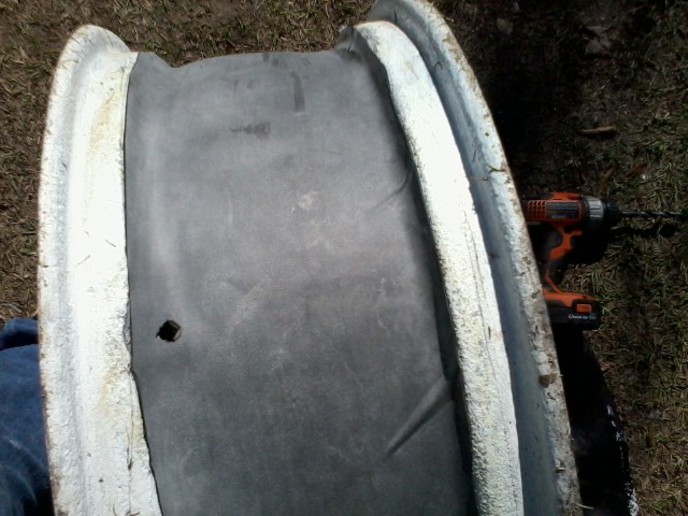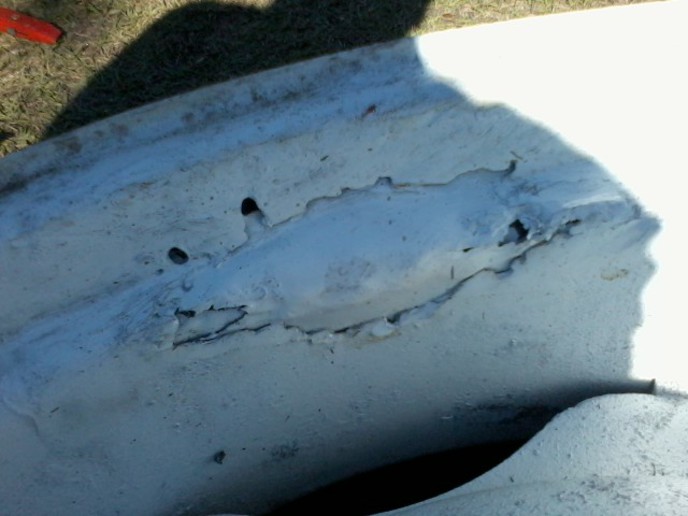I just posted a reply to George on the Tool forum. He was asking about draining the oil out of a small generator and then keeping the oil warm in the house. Then putting the oil into the generator when it was cold to help the generator start. HE was wondering if the warm oil would help the small motor start.
This made me think about how I started the Ford 6000 I had, to be able to do winter chores.( Did not know about any type of electric heater that would have worked and could not have afforded it anyway) Basically I had a valve in place of the oil drain plug. I would drain the engine oil when I was done with the tractor for the day. I used a steel Jerry can to keep the oil in. I would set it next to the hot water radiator heater in the house. I do mean right next to it, As in against the heater.
So I would get up and put a small trickle battery charger (only one I had) on the tractor first thing, even before breakfast. Then after the feeding chores I would take an old hair dryer (only worked on low, Wife threw it out, I "saved" it LOL). I kept the air intake clamp, lose in the winter. So I would unplug the battery charger and plug in the old hair dryer. I would stick the hair dryer into the intake manifold. I would then pour the warm oil back into the engine. I would then let it set a few minutes to warm everything on the bottom up. The tractor started like it was summer.
I now know several ways that I could have put a heater on the engine of the tractor. Then I did not know and could not have afforded it anyway.
I can remember having to take an old inter tube and cut it to fit inside of wagon tires so I could put the "good" tube inside of the "liner" so the cracks in the tire would not cut the tube and the tire would hold air. I still think of how dangerous that was. I do mean wagons that we hauled corn in. They where just on the farm but they still easily could have hurt someone or upset a wagon on the side hills we farm.
I can remember draining the water out of the JD "G" every night when plowing in the fall when it got to below freezing. Then putting warm water in the next day to plow with. Had spring water but no antifreeze. Plus the head casket would seep when it set a long time not running, like over winter. Then you would have water in the cylinder bore. So I never did have antifreeze in that tractor the whole time I owned it.
I also can remember it being so cold that I would put a pan I had made to "fit" around the carburetor on the JD "G". I would put some HOT water in it to make the gas vaporize better so I could hand start it easier if I had too.
On real cold mornings that I had to start the JD "G" to frost plow with, I would sometimes take a steel hog pan full of the hot coals out of the coal stove. I would put them right under the block and transmission housing. Then stand a piece of used metal sheeting on each side and a bale of straw on each end to hold the heat under the tractor. After maybe an half an hour the starter would spin it over if I had a "GOOD" battery in it. (Meaning one I had swiped out of something else I was not needing that morning)By hand if I did not have a good battery.
At one time I just had one good battery for three things. The JD "G" which had a magneto ignition on it, the pickup, and the old 1952 1 ton truck we hauled hogs in. If I needed two things running I had to start them on the good battery and then remove it for the other one. On the JD "G" that was easy. I just unhooked the generator wire so that it did not charge. Once it started the magneto did not need any power so I could take the battery out. If I killed it I usually could hand crank it while it was still warm. The old one ton had a battery that would hold charge while you where using it. It would even start after maybe an hour of setting but not if you let it set more than that. So If I could get close enought with the pickup I would just use the jumper cables on it. Many times though I had the ton truck in the granary because it was loaded with corn and I need it under cover. Then I would take the battery out of the pickup and carry it back to the old One ton and jump it that way. Remember on the Chevy trucks in the early 1950s the battery was under the passenger floor board not up front. My trickle battery charger would not charge it enought to start it.
So the long and short of this is I spent loads of time just to get things to work. We did not have much money and we had to make do. I think this is why I now make sure every little thing works on stuff. I may not buy new but it is going to function like new if it can be made too.
So what have you guys had to do or maybe even still have to do just to get buy????
This made me think about how I started the Ford 6000 I had, to be able to do winter chores.( Did not know about any type of electric heater that would have worked and could not have afforded it anyway) Basically I had a valve in place of the oil drain plug. I would drain the engine oil when I was done with the tractor for the day. I used a steel Jerry can to keep the oil in. I would set it next to the hot water radiator heater in the house. I do mean right next to it, As in against the heater.
So I would get up and put a small trickle battery charger (only one I had) on the tractor first thing, even before breakfast. Then after the feeding chores I would take an old hair dryer (only worked on low, Wife threw it out, I "saved" it LOL). I kept the air intake clamp, lose in the winter. So I would unplug the battery charger and plug in the old hair dryer. I would stick the hair dryer into the intake manifold. I would then pour the warm oil back into the engine. I would then let it set a few minutes to warm everything on the bottom up. The tractor started like it was summer.
I now know several ways that I could have put a heater on the engine of the tractor. Then I did not know and could not have afforded it anyway.
I can remember having to take an old inter tube and cut it to fit inside of wagon tires so I could put the "good" tube inside of the "liner" so the cracks in the tire would not cut the tube and the tire would hold air. I still think of how dangerous that was. I do mean wagons that we hauled corn in. They where just on the farm but they still easily could have hurt someone or upset a wagon on the side hills we farm.
I can remember draining the water out of the JD "G" every night when plowing in the fall when it got to below freezing. Then putting warm water in the next day to plow with. Had spring water but no antifreeze. Plus the head casket would seep when it set a long time not running, like over winter. Then you would have water in the cylinder bore. So I never did have antifreeze in that tractor the whole time I owned it.
I also can remember it being so cold that I would put a pan I had made to "fit" around the carburetor on the JD "G". I would put some HOT water in it to make the gas vaporize better so I could hand start it easier if I had too.
On real cold mornings that I had to start the JD "G" to frost plow with, I would sometimes take a steel hog pan full of the hot coals out of the coal stove. I would put them right under the block and transmission housing. Then stand a piece of used metal sheeting on each side and a bale of straw on each end to hold the heat under the tractor. After maybe an half an hour the starter would spin it over if I had a "GOOD" battery in it. (Meaning one I had swiped out of something else I was not needing that morning)By hand if I did not have a good battery.
At one time I just had one good battery for three things. The JD "G" which had a magneto ignition on it, the pickup, and the old 1952 1 ton truck we hauled hogs in. If I needed two things running I had to start them on the good battery and then remove it for the other one. On the JD "G" that was easy. I just unhooked the generator wire so that it did not charge. Once it started the magneto did not need any power so I could take the battery out. If I killed it I usually could hand crank it while it was still warm. The old one ton had a battery that would hold charge while you where using it. It would even start after maybe an hour of setting but not if you let it set more than that. So If I could get close enought with the pickup I would just use the jumper cables on it. Many times though I had the ton truck in the granary because it was loaded with corn and I need it under cover. Then I would take the battery out of the pickup and carry it back to the old One ton and jump it that way. Remember on the Chevy trucks in the early 1950s the battery was under the passenger floor board not up front. My trickle battery charger would not charge it enought to start it.
So the long and short of this is I spent loads of time just to get things to work. We did not have much money and we had to make do. I think this is why I now make sure every little thing works on stuff. I may not buy new but it is going to function like new if it can be made too.
So what have you guys had to do or maybe even still have to do just to get buy????



